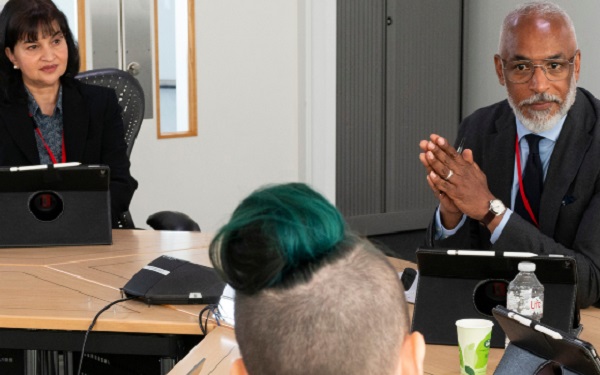
Social Work England is to hold more fitness to practise hearings this year as its case backlog continues to grow.
The regulator plans to hold 81 final hearings to determine a social workers’ fitness to practise in 2024-25, up from a previously planned 34.
Most of the additional hearings will take place from January to March 2025, subject to the availability of parties and witnesses.
Budget found to increase hearings numbers
A lack of budget to hold hearings has been a key factor in mounting fitness to practise case backlogs over the past year.
But Social Work England said that it had “identified some additional capacity” within its 2024-25 budget following a mid-year review.
As of 30 September 2024, the regulator had accrued a £1.5m underspend on its budget, primarily due to lower than expected staffing costs and an accounting change that had pushed some legal fees into future years.
Mounting case backlogs
The decision to increase hearings numbers comes with case backlogs continuing to rise. According to Social Work England’s latest board report, issued last month:
- The number of open cases awaiting a hearing rose from 386 to 399 in the second quarter of 2024-25 (1 July to 30 September).
- The average age of a case awaiting hearing, from the point of the regulator receiving the fitness to practise concern, rose from 165 to 173 weeks in the second quarter of 2024-25. This is equivalent to three years and four months.
- The number of cases that had been open for at least three years rose from 294 to 335 during the second quarter of 2024-25.
- Over the same period, the number of cases that had been open for at least a year rose from 1,052 to 1,090.
Progress on completing investigations
The regulator has made some progress in reducing delays at earlier stages of its fitness to practise process.
It concluded 148 investigations in the second quarter of 2024-25, up from 129 in the previous quarter, with the (median) average time taken to conclude these falling from 68 to 60 weeks between the two quarters.
The average age of its investigations caseload fell slightly, from 68 to 67 weeks, between the two quarters. However, this was significantly above its target of 58 weeks.
Reduction in case examiner timeframes
There was a similar trend in relation to the case examiner stage, when regulator staff examine the investigation report to determine whether there is a realistic prospect that concerns could be proved, and if so, whether fitness to practise could be found to be impaired.
Case examiners completed 119 cases in the second quarter of 2024-25, up from 85 in the first quarter, with the average age of concluded cases falling from 113 to 103 weeks.
The average time taken to conclude the case examiner process alone fell from 14 to 13 weeks between the two quarters, against a target of less than 12 weeks.
More delay at the triage stage
However, delays have increased at the triage stage, when the regulator determines if there are reasonable grounds to investigate the concerns and whether the concerns suggest the social worker’s fitness to practise is currently impaired.
The number of cases closed at the triage stage or that progressed to an investigation fell from 350 in the first quarter to 327 in the second quarter of 2024-25.
The average age of the triage caseload rose from 24 to 29 weeks, against a target of 19 weeks, while the number of cases open at that stage increased from 1,030 to 1,070 during this time.
Earlier in the year, Social Work England recruited six people into new roles in the triage team in order to improve timeliness. The regulator said they had now been trained and that it expected improvements in timeliness during the rest of 2024-25.
Cases put on hold pending legal advice
However, it added that some triage cases were on hold because of a need for it to seek legal advice.
In a statement to Community Care, Social Work England said: “Concerns we receive in relation to social workers are often complex, and at the start of our fitness to practise process we are frequently provided with large numbers of documents.
“In order to ensure that we are complying with any legal obligations as to how we use these documents (for example where the documents contain information that might relate to family court proceedings) we take a careful approach to how we progress our cases, which may often include seeking legal advice.
“We continue to look at ways to balance our careful use of such documents alongside the efficiency of our processes, and this includes discussing ways to do this with our sponsor department, the Department for Education.”
Research into ‘seriousness’ in fitness to practise cases
Meanwhile, the regulator has issued a tender for an organisation to carry out research into how “seriousness” relates to fitness to practise proceedings and outcomes.
Under Social Work England’s fitness to practise rules, one of the criteria triage staff may use in determining whether a concern is worth investigating is its “seriousness”, with reference to the regulator’s overarching objective of public protection.
The research is designed to answer the following questions:
- How Social Work England’s fitness to practise outcomes to date have explored and described the concept of seriousness.
- How different health and social care regulators’ case law and guidance define seriousness in their fitness to practise processes, and how this has evolved over time.
- How the Professional Standards Authority, which oversees health and social care professional regulators, approaches seriousness, and how this has evolved over time.
- How seriousness is understood and interpreted within complex aspects of fitness to practise, such as misconduct, dishonesty and public interest.
- How decision makers understand and use guidance and case law in relation to seriousness throughout Social Work England’s fitness to practise proceedings.
- What ‘human factors’, such as the workplace environment, should (or should not) be considered by Social Work England when considering seriousness in fitness to practise proceedings.






 Bournemouth, Christchurch and Poole
Bournemouth, Christchurch and Poole  Hampshire County Council
Hampshire County Council  Oxfordshire County Council
Oxfordshire County Council  South Gloucestershire Council
South Gloucestershire Council  Wokingham Borough Council
Wokingham Borough Council  Webinar: building a practice framework with the influence of practitioner voice
Webinar: building a practice framework with the influence of practitioner voice  ‘They don’t have to retell their story’: building long-lasting relationships with children and young people
‘They don’t have to retell their story’: building long-lasting relationships with children and young people  Podcast: returning to social work after becoming a first-time parent
Podcast: returning to social work after becoming a first-time parent  How managers are inspiring social workers to progress in their careers
How managers are inspiring social workers to progress in their careers  Workforce Insights – showcasing a selection of the sector’s top recruiters
Workforce Insights – showcasing a selection of the sector’s top recruiters 

 Facebook
Facebook X
X LinkedIn
LinkedIn Instagram
Instagram
It took SWE 12 months to inform me of a triage decision to undertake an investigation after it was made. Then a further 19 months to conclude its investigations with the result that there was no evidence to substantiate the complaint, a total of 2 years and 7 months. As a Social Worker I would not be allowed this time to conclude an assessment
David I’m so sorry to hear that you have had this experience, I am in the process of being investigated. It is currently 36 months since I was informed that a concern had been raised. the case has been sent to examiners but stopped and sent back to investigator for information that was missing that I had requested twice.
I have made the exact point in my responses of late. we, as social workers have a finite time to conclude and assessment (stat45) ut generally are expe Ted to conclude 10-30days. If we kept the children and families hanging in limbo for this NY longer than this we would face disciplinary. What about our mental health and wellbeing???
I agree with you fully and especially that they found no evidence to substantiate the concern!!
I’m sorry to hear you have had such a difficult time. The whole system is a disgrace. I am currently working with a social worker who has just been sent dates for a FTP Hearing. He/she had sent dates when he/she could be available. The date SWE allocated for a 7 day hearing are dates when he/she is unavailable, and only THIRTEEN DAYS SHORT OF SIX YEARS SINCE THE INCIDENT THAT TRIGGERED IT!
Saying nothing, only masks and support poor pratice and discriminatory pratice thrive.Yet social workers can find themselves in position’s whereby they have little or no support to challenge such behaviour.
Social workers do not hold financial responsibility to ensure the workforce,service and profession benefit from relevant and appropriate resources.This is in the hands of those we vote to represent our rights.Is it not!
Pointing out such pratice can only support the rights of others and the overall impact.
No doubt I would be referred to Social Work England regarding concerns as to my practice. SWE justify its inaction as due to lack of resources, but seems to dismiss the same when Social Workers say they lack the time to do their jobs effectively?
I don’t think SWE is fit for purpose, David and we pay to be subject to that their failings.
Keeping people on tenterhooks for years is appalling.
And the debacle with the CPD this year is another example of them biting off more than they can chew.
I pray the researchers will find that SWE’s determined oppression of social workers is ‘serious’. When will SWE be stopped?
If SWE was transparent about it’s investigations then we would know whether vacancies, budget constraints, “hot desking”, inadequate administrative support, outdated computer systems, lack of or poor supervision, dilapidated working environments and the likes qualify as “human factors” impacting on our performance.
Social Work England claim a lack of resources that limits it’s ability to carry out its functions. Still it does not seem to acknowledge the same when it investigates Social Workers, eg in maintaining case recordings. We have a defined working week and this should be recognised and valued.
I know of a number of Local Authorities using the ‘Fitness to Practice’ route as a disciplinary tool to frighten social workers into not having out of timescale single assessments.
We should call on SWE to publish their accounts to show exactly where our registration fees are spent. I would not be surprised one bit if registration fees are increased; using ‘lack of resources and increased costs’ as rationale…
SWE are in breach of the Equalities Act. Evidence shows that it disproportionately investigates and sanctions social workers with protected characteristics such as ethnic minorities and mental disorders.
I agree. They also do not appear to take into account discrimination re physical illness and health conditions, and the way they investigate implicitly condones the actions of local authorities who take a punitive approach to sick leave, hidden disability, and overloading of social workers, which can damage both mental and physical well-being.
Duncan,Although I recognise such agency’s should be in place to support and Protect children and families.I agree fitness to pratice referrals are targeting certain minorty groups.No doubt in my mind about this.
Are manager’s implying employees from minorty groups are less effective.?
Attitudes, recognising and understanding diffrent community needs and languge ,training made available,effective meaningful and supportive supervision and more should be considered.
Are manager’s now only employed to ensure targets are met?
If certain sections of the workforce are faced with racism
what does this tell you about the service children and families from minorty groups area also receiving.
If you have achieved your degree/masters you are able to learn and expect support inorder to support you deliver a service to all sections of the community.
SWE should insist that all supporting evidence is submitted within 10 working days of a concern being raised. If the complainant is sufficiently concerned then they should have the evidence easily to hand.
SWE should then triage according to the evidence before it.
I was reported in the November, and my ex manager took until the following May to submit supporting documents. It wasn’t until the following November that I learned that I had no case to answer.
As a locum social worker I found it impossible to secure employment, given the need to be transparent about the investigation. I almost lost my home, and marriage, and my mental health became so bad that I had to attend a panel to discuss temporary suspension on the grounds of my poor mental health. I successfully argued that the process itself was the catalyst and that my response was to be expected due to the level of stress that I was placed under.
The whole situation was Kafkaesque.
The one positive I have taken from the experience is greater empathy for parents in Care Proceedings, the day to day terror, the knot in the stomach, acute anxiety and depression, the loss of hope and motivation, the sense of being stuck in a tunnel with no glimmer of a light.
Even now, from the distance of a few years I am anxious at work. Although a highly respected practitioner I am terrified that something will happen to put me back there. I say yes to every manager and work 60-70 hours per week just t be sure that everything is perfect, and it’s unsustainable, and it means that I don’t have time to even begin to process the trauma I experienced as a result of the allegation.
So sorry that you experienced this.
The current work culture you are in is not right. As a trade union rep I would be keen to support anyone in my organisation that was feeling as you are.
Frasirfanclub1, what you have experienced I imagine is exactly what children,family’s and young people feel when we intervine.What no one appears to acknowledge is the impact and real trauma not only experinced by the employee but also the impact on family members and one’s confidence and mental health.
If the service is taking one to two years to make a decision is it really an appropriate referral to the correct services? Is it not a lack of respect for an employee to wait months to be told of a complaint to then wait months before being notified they had nothing to answer to.
How can anyone have any trust in an organisation they work for if employees are treated in this manner, is this not a work place based on fear? It is therefore not hard to understand why it is difficult to find the right candidates for such a role.
It appears those who are in position’s of power feel they can do what they want,say what they want with out having to justify/evidence careful consideration of the appropriatness of the referral.
Minority employees and service users face discrimination from all levels and are easy targets to discrinate against dispite there being laws in place, and due to under representation from those in senior position’s.
The same attitudes are experienced by those we claim to be the voice of if you are part of a minority.
These are my experiences which I am able to evidence.
Being open and honest should not be fearful.We all have experience which are valued and impact our emotions,daily lived experiences and decision making.
Remember no one can give me/you the right to be a human being, to have my views, wishes, and opinions, we are born with that right you can deny me the right if you have all the police, powers, authority, and jobs on your side.
You can deprive me of it but you can not take away my pride, my dignity and who I am, and the dreams god gave me. I was born with it just like you were. I have the right to believe in who I am and who I want to be.
Remind yourself I have the same right to be the best I can just like you.
Never allow anyone to make you feel less than them. Be strong but not rude, be kind but not weak, be humble but not timed, be proud but not arrogant.”
This applies to employees and service users.We are all human beings.
Based on my experiences and critical observations racism exist on all levels.In 2024 you can not tell me black Asion and minority groups do not have the skills and knowledge to be in position’s which reflect society today.